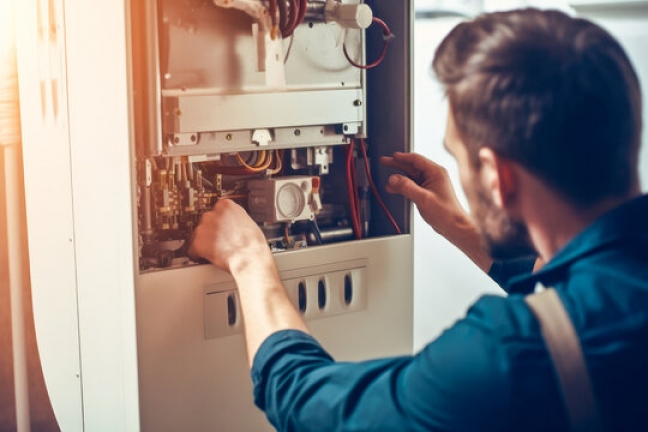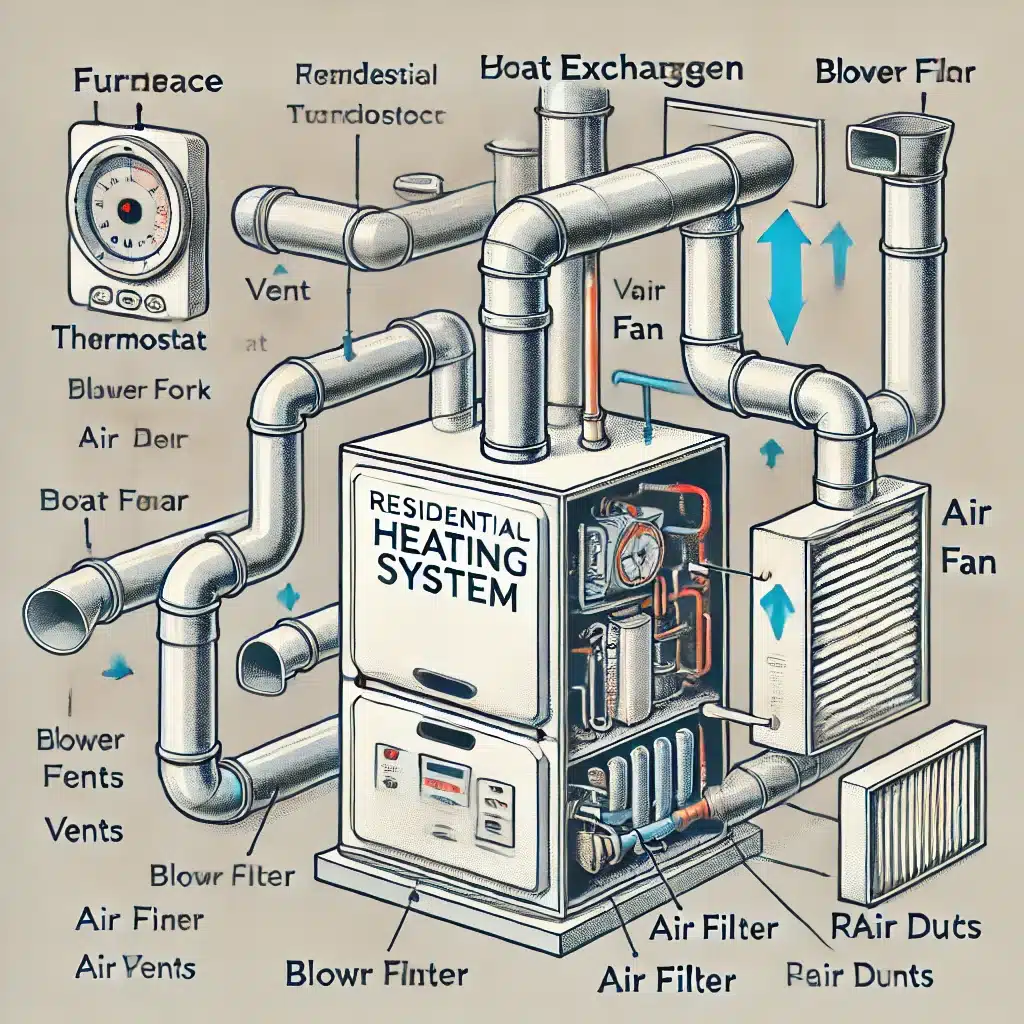Residential HVAC Maintenance Tips | Bean’z Heating & Cooling Experts
Comprehensive Guide to Residential HVAC Heating System Maintenance Your home’s HVAC (Heating, Ventilation, and Air Conditioning) system is crucial for maintaining comfort throughout the year, particularly during the colder months. Regular HVAC maintenance, especially for the heating system, ensures not only your comfort but also the system’s efficiency, safety, and longevity. In this blog, we’ll…

Comprehensive Guide to Residential HVAC Heating System Maintenance
Your home’s HVAC (Heating, Ventilation, and Air Conditioning) system is crucial for maintaining comfort throughout the year, particularly during the colder months. Regular HVAC maintenance, especially for the heating system, ensures not only your comfort but also the system’s efficiency, safety, and longevity. In this blog, we’ll discuss why heating system maintenance is essential, steps for regular upkeep, and tips to maximize efficiency, all while keeping your home warm and your energy bills under control.
Why Heating System Maintenance is Important
A well-maintained HVAC heating system offers multiple benefits, from improving indoor air quality to ensuring consistent heating throughout your home. The key advantages include:
- Energy Efficiency: A clean and tuned-up heating system uses less energy to heat your home. Dirty filters, blocked vents, or malfunctioning components force the system to work harder, increasing energy consumption.
- Cost Savings: Regular maintenance helps detect minor issues before they escalate into costly repairs or replacements. A well-maintained system operates more efficiently, reducing energy costs by up to 30%.
- Improved Air Quality: Over time, dirt, dust, and allergens can accumulate in your HVAC system. Regular cleaning and filter replacement improve indoor air quality and reduce allergens, benefiting household members, particularly those with respiratory issues.
- Extended Lifespan: Like any mechanical system, your HVAC’s heating unit will last longer with proper care. Regular maintenance can extend the lifespan of your system by several years, delaying the need for a costly replacement.
- Enhanced Safety: If you use a furnace or boiler, maintenance ensures these components are functioning safely. Faulty gas lines or heat exchangers can lead to dangerous leaks like carbon monoxide, which poses serious health risks.
Basic Components of a Residential Heating System
Before diving into maintenance tips, it’s essential to understand the basic components of a residential HVAC heating system. These include:
- Furnace: The main component that generates heat through gas, oil, or electricity.
- Heat Exchanger: Transfers heat from the furnace to the air or water, depending on the system.
- Thermostat: Regulates the temperature by controlling when the heating system turns on or off.
- Ductwork: Channels warm air throughout your home.
- Filters: Traps dust, allergens, and other airborne particles, preventing them from entering your system.
- Blower Motor: Circulates warm air from the furnace through the ductwork and into your living spaces.

Each of these components requires attention to ensure optimal performance and efficiency.
Steps for Routine HVAC Heating System Maintenance
Taking a proactive approach to HVAC heating system maintenance can help prevent unexpected breakdowns. Here’s a step-by-step guide to maintaining your heating system:
- Replace or Clean Air Filters (Every 1-3 Months)
- Air filters prevent dust, dirt, and allergens from circulating throughout your home. Dirty filters reduce airflow and force the system to work harder, increasing energy consumption.
- Check your filters monthly during heavy usage seasons (winter for heating systems), and replace them as needed. If you have washable filters, clean them according to the manufacturer’s guidelines.
- Inspect the Thermostat (Annually)
- Ensure that your thermostat is set to the correct temperature and functioning properly. Upgrading to a programmable thermostat can help save energy by automatically adjusting the temperature when you’re away or asleep.
- Check the Blower Motor (Annually)
- The blower motor is responsible for circulating air throughout your home. Over time, the motor can become clogged with dust, affecting its efficiency.
- Clean the blower motor and fan blades annually. If you hear unusual noises from the blower, it may indicate a problem that requires professional attention.
- Clean the Ductwork (Every 2-3 Years)
- Over time, dust, dirt, and other particles can accumulate in the ductwork, reducing airflow and indoor air quality.
- Hire a professional to clean your ductwork every few years, or sooner if you notice excessive dust around your vents or inconsistent heating in your home.
- Inspect the Heat Exchanger (Annually)
- The heat exchanger is critical for heating your home efficiently and safely. Cracks or damage can lead to carbon monoxide leaks.
- Hire a professional HVAC technician to inspect the heat exchanger annually, especially if you have an older furnace.
- Examine the Furnace Flame (Annually)
- The furnace flame should burn a steady blue color. A yellow or flickering flame can indicate incomplete combustion, which may release harmful carbon monoxide.
- If you notice a change in the flame’s color, turn off the furnace immediately and call a professional.
- Lubricate Moving Parts (Annually)
- The moving parts of your HVAC system, such as the blower motor, require lubrication to reduce friction and prevent overheating.
- Apply the appropriate lubricant to the moving parts annually to ensure smooth operation and avoid unnecessary wear and tear.
- Test Carbon Monoxide Detectors (Monthly)
- If your heating system relies on gas or oil, installing carbon monoxide detectors is a must. Test these detectors monthly and replace the batteries regularly to ensure they’re functioning properly.
When to Call a Professional HVAC Technician
While many maintenance tasks can be done by homeowners, there are some situations that require professional assistance. Call an HVAC technician if:
- Your heating system makes loud or unusual noises.
- Your energy bills suddenly spike without any change in usage.
- You notice uneven heating or cold spots in different parts of your home.
- There is a persistent, unpleasant odor coming from the vents.
- The furnace flame changes color, indicating possible combustion issues.
Professional technicians have the knowledge, tools, and experience to diagnose problems accurately and safely.
Maximizing the Efficiency of Your Heating System
Regular maintenance will significantly enhance your system’s performance, but there are additional steps you can take to ensure your heating system runs at peak efficiency:
- Seal Leaks and Drafts: Use weatherstripping or caulking to seal drafts around windows, doors, and other openings. This prevents heat from escaping and reduces the workload on your heating system.
- Install Insulation: Ensure your home is properly insulated, particularly in the attic, walls, and basement. Proper insulation reduces heat loss and helps maintain a consistent indoor temperature.
- Use Ceiling Fans: Set ceiling fans to rotate clockwise during the winter. This pushes warm air, which naturally rises, back down into the living areas.
- Program Your Thermostat: Set your thermostat to lower temperatures when you’re asleep or away from home. A reduction of just 7-10 degrees for 8 hours a day can result in substantial energy savings.
- Schedule Regular Professional Inspections: Even if you perform basic maintenance, an annual inspection by an HVAC professional ensures that your system is working optimally and safely.
Conclusion
Proper HVAC heating system maintenance is crucial for ensuring comfort, safety, and efficiency during the cold months. By following routine maintenance steps, such as changing filters, inspecting components, and calling a professional when necessary, you can prevent costly repairs and extend the lifespan of your system. In addition, taking proactive measures like sealing drafts, using insulation, and installing programmable thermostats will enhance efficiency, reduce energy bills, and keep your home comfortable all winter long.
Investing a little time and effort into HVAC heating system maintenance will pay off with lower costs, improved indoor air quality, and peace of mind throughout the heating season.

